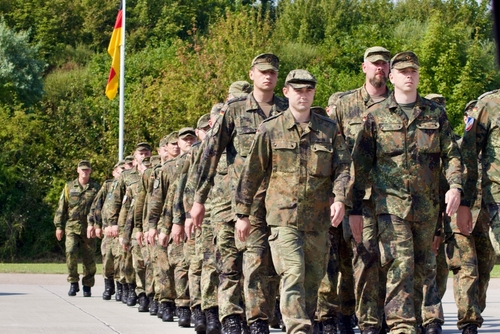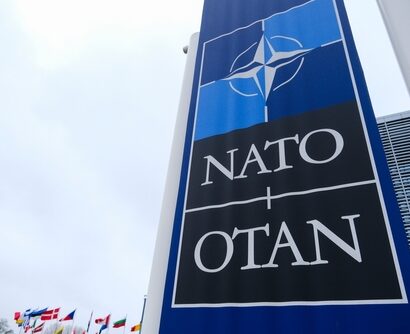Abstract: The U.S. is no longer primarily focused on the security of Europe. This is the fundamental view within the current administration under President Trump. Still, it also reflects the views of many American politicians beyond the current administration and has been gaining ground since Obama’s presidency. As a result, Europeans will have to take responsibility for conventional security on their continent themselves. Germany, the most populous and economically strongest country in the EU, will need to intensify its efforts by significantly expanding its military share to achieve credible conventional deterrence against Russia. This will not succeed without a return to conscription. An assessment that has long been called for, considering the overwhelming benefits of a universal and fair conscription, is supported by the majority of the population and is now increasingly shared by many political decision-makers and security and defence experts.
Problem statement: How can Germany succeed in strengthening the effectiveness of the Bundeswehr and, at the same time, the resilience of the German population?
So what?: The successful reinstatement of universal conscription would be a relevant step toward a Bundeswehr that is ready for defence and capable of waging war. A significant shift in prevailing policy necessitates a corresponding change in the German mindset and must be implemented collectively, institutionally, and individually.

Source: shutterstock.com/Ryan Nash Photography
Consequences of the Return to National and Alliance Defence
In principle, the Bundeswehr has focused on its constitutional core mandate under Article 87a of the Basic Law since the outbreak of the Russian war of aggression against Ukraine.[1] Nevertheless, this paradigm shift towards National and Alliance Defence (NAD) was initiated gradually but too hesitantly much earlier, namely with the illegal annexation of the Crimean Peninsula by Russia in 2014. NATO has responded to the new security policy threat situation and has extensively revised its defence plans due to the ongoing Russian aggression. These results, among other things, lead to significantly higher personnel demands on Germany from the military alliance.
The June 2025 revision of the NATO Defence Planning Process (NDPP) will increase the previous requirements for the military capabilities of individual allies by 30 per cent.[2] Top priority will be given to capabilities such as long-range precision strike weapon systems, air defence, and land forces’ mobility. This also determines how much Germany must invest in defence. At the NATO summit in The Hague, NATO Secretary General Mark Rutte’s proposal to allocate 3.5 per cent of gross domestic product to pure military spending and a further 1.5 per cent to the civilian sector of total defence, such as infrastructure and cybersecurity, was jointly agreed by the allies. The specific targets are top secret, but for the Bundeswehr, the new capability goals mean a personnel increase to approximately 460,000 soldiers, consisting of active troops (200.000) and reserves (260,000), the procurement of materials, weapon systems, and equipment, an increase in defence spending, and the expansion of industrial capacities in the defence sector.[3]
The June 2025 revision of the NATO Defence Planning Process will increase the previous requirements for the military capabilities of individual allies by 30 per cent.
The “Treaty on the Final Settlement with Respect to Germany” of September 12, 1990, limits the strength of the Bundeswehr to 370,000 active soldiers.[4] This theoretical number of contract soldiers and professional soldiers is legally possible, but due to high costs and the already demanding personnel recruitment today, it is practically unachievable. Presumably, even newly acquired or increased financial resources initially do not change this, which will be possible in the future due to the exemption for defence spending from the so-called “debt brake” in Article 109 Paragraph 3 of the Basic Law. The core problem remains: The personnel of the Bundeswehr are ageing and insufficient in number. The mentioned NATO requirement can only be met if personnel for the army outside the “active troops” can be recruited from a large number of conscripts and combat-ready reservists.
Errors of the Past
The hasty and unqualified suspension of conscription in 2011 can be classified 14 years later as one of the most significant and most consequential security policies, but at the same time, a social policy error in the history of the Federal Republic.[5] Since then, the armed forces have been lacking suitable personnel more than ever before; the number of reservists is declining, and interaction between the military and the population has decreased. Additionally, the abolition of civilian alternative service has also led to a disconnection between the population and the state. This negative development means that German citizens and the German state now only have a consumer-business relationship. There is no identification with the common good.
Correcting this error requires immense financial, social, and infrastructural efforts. It must be guided by the inner attitude, in which security and defence concern every citizen of this country and demand their contribution to the ongoing security and defence efforts. This particularly requires a holistic societal shift in mentality.[6] Without safety, everything else is meaningless.[7] Security enables freedom and the Western way of life in a democracy with a pluralistic society. The personal sacrifices that each person may be required to make are what allow them to complain about grievances, e.g., excessive rents or gender discrimination. Security and defence are not the primary responsibilities of the armed forces, police, or intelligence services and are not limited to repelling military threats. It is primarily the task of the citizen. Everyone “must” fulfil their contribution to the common good, rather than merely “can.” Consequently, everyone benefits from the freedom of a liberal, pluralistic democracy. This does not simply refer to the duty to serve in the military. Instead, a comprehensive societal rethinking is needed, where Deutsche Bahn no longer transports passengers from Munich to Kiel late or not at all. Lufthansa and its subsidiary will not fly tourists in and out of the world’s holiday resorts, but are primarily entrusted with transporting wounded and traumatised soldiers and war equipment to and from an unspecified war front.
Security enables freedom and the Western way of life in a democracy with a pluralistic society.
However, for this to happen, society, that includes every resident, would first have to understand the security situation in which Europe and Germany find themselves today: an imperialist Russia in the East, a social division at home that runs along problematic migration policy, an insufficiently processed corona policy and precarious economic development, the Trump administration in the U.S., which is turning the geopolitical order of the last 35 years upside down, as well as the great European disunity at many political and social levels. Here, the primary task of politics would be to prepare society for these new realities and the associated inconveniences and to provide a guideline through decisive political leadership. Instead, since the 2025 Bundestag elections, “business as usual” can also be observed here, guided by the desire to suggest as much normality as possible. One might claim that Germany is sleepwalking through a socio-political turning point, which, at least globally, is becoming increasingly apparent.
Nevertheless, the figures that became known during the first exploratory talks indicate that political pressure on the Bundeswehr, under Chancellor Merz, to deliver viable concepts for regaining its ability to fight will increase.
How Many Personnel Does the Bundeswehr Need at All?
Germany’s compulsory service model prior to 2011 was allegedly unjust. Only a tiny proportion of young men with German citizenship who were subject to military service were even drafted for military service or alternative service. In addition, there was no freedom of choice between military or alternative service; the path to alternative service had to overcome the cumbersome and bureaucratic hurdle of conscientious objection as a matter of conscience.
Anyone who wants to perform an alternative service instead of military service should be able to do so without any hurdles or commissions. The new military service model promoted by Defence Minister Boris Pistorius in 2024 is based on the model of the reintroduced conscription of the Swedish armed forces (so-called “Swedish model”) and pursues two intentions: apart from the initially announced 5,000 additional conscripts in 2025, the necessary structures are to be created by the end of the decade so that up to 15,000 additional young people per year can do military service in the future.[8] A physical examination for young men will once again be mandatory starting in July 2027.[9] This would at least significantly increase the pool of potential reservists for the first time since the suspension of compulsory military service.
The new military service model promoted by Defence Minister Boris Pistorius in 2024 is based on the model of the reintroduced conscription of the Swedish armed forces.
In the medium to long term, the Bundeswehr could recruit more former soldiers beyond retired contract soldiers, thereby reaching its self-imposed target of 200,000 reservists who regularly train and are called up for duty. With approximately 200,000 active contract and professional soldiers, the personnel basis for a war-ready Bundeswehr is to be formed.[10] However, the “Swedish model” can only be considered in the initial phase of reintroducing compulsory military service. The model mentioned does not cover the already known military personnel requirements of 460,000 soldiers, which are likely to increase due to the feared loss of U.S. troops in Europe, nor does it provide for a general and thus fair conscription. General conscription should be designed in such a way that everyone contributes to security, defence and the preservation of the common good by performing military or alternative service.
A Year of Duty and a Life Full of Rights
According to the Federal Statistical Office, for example, in 2023, 692,989 people were born in Germany, of which 355,298 were male, 337,684 female, and seven were diverse or without specifying a gender. Previous cohorts, however, always had more than 700,000 births.[11] One of the means of general compulsory military service must be to oblige every person of a birth cohort to serve the state and society by completing a twelve-month military or alternative service between the ages of 18 and 21.
Exceptions to compulsory military service may only be made in cases of hardship in which neither the performance of military service nor alternative service would be reasonable, e.g. in the case of serious illness or infirmity. General conscription also means that a duty must be made across all social differences. The potentially high number of conscripts to be trained each year will pose a significant challenge for the Bundeswehr. Currently, it is at least doubtful whether the armed forces, in their current condition, can master this task.
According to the maxim “whatever it takes,” postulated by former Chancellor Scholz and then almost-Chancellor Merz, all necessary efforts to achieve war readiness must be accelerated. This will undoubtedly be financially very expensive at first, but the slogan used to suspend conscription in 2011—that a professionalised military would be cheaper than a conscripted military—can be seen in retrospect as an illusion and a naive fallacy. In addition to the logistical, infrastructural, administrative, personnel, social and material effort that conscription will entail, the Bundeswehr’s internal attitude towards conscripts must also change. Conscripts must be understood as the most important link to the population, a possible personnel pool and, both as active soldiers and as reservists, as an integral part of the Bundeswehr’s defence planning. Military service and, of course, substitute service personnel must be trained extensively, their service must be valued and not wasted as cheap temporary workers. The training focus for the conscripts is on the NAD and its future role in the Bundeswehr reserve. At the same time, some of the temporary and professional soldiers should continue to be prepared and retained for international crisis management. Suppose the armed forces succeed in making the twelve-month service fulfilling for the young adults. In that case, this automatically contributes to the credibility of Germany’s defence capability and the envisaged war capability of the Bundeswehr. Both are necessary prerequisites for securing peace through deterrence.
According to the maxim “whatever it takes,” postulated by former Chancellor Scholz and then almost-Chancellor Merz, all necessary efforts to achieve war readiness must be accelerated.
Ultimately, both the individual and the general public benefit from general conscription. Concerns that the Federal Republic of Germany might exceed the NATO requirements mentioned are not a suitable argument against the proposed conscription. No NATO partner will complain about a German increase in soldiers. Germany’s neighbours will not raise any historical concerns but expect us to finally take on more responsibility for Europe’s security. There is a historic opportunity for the Federal Republic of Germany and for the Bundeswehr to step out of the narratives of the post-war order and the old patterns of thought. These must be used.
Need to Adapt the Legal Basis
The current constitutional basis for military service in Article 12a of the Constitution only obliges men from the age of eighteen to serve in the armed forces, in the Federal Border Guard or a civil defence association or, in the event of a conscientious objection, to perform alternative service. Persons of female or diverse genders are not currently subject to compulsory military service; therefore, a constitutional amendment would be required.[12] A corresponding adaptation of the Basic Law would be desirable, particularly in achieving equal social and legal treatment of the sexes. Still, in view of the constitution-amending majorities of the 21st German Bundestag, it seems remote for the time being and will not be discussed further at this point.
Nevertheless, the constitution offers potential legal workarounds for obliging men without German citizenship to perform military or alternative service.[13] It’s worth considering, for example, foreign males with permanent residence permits who grew up here and have their permanent centre of life in Germany. However, it would require an amendment to the Compulsory Military Service Act and some other changes in the area of military and substitute service provisions. Compulsory military service could be linked to more precisely defined facilitations around citizenship law. Conscription could thus serve as an element that accelerates integration and unification. This would allow the most important program points of the voted-out traffic light government (shorter naturalisation periods and dual citizenship) to be combined with the Union parties’ desire for a stronger focus on the principle of “promote and demand” regarding the award of the German passport. The latter amendments would not require any constitutional amendment and could therefore be implemented in a timely manner.
It’s worth considering, for example, foreign males with permanent residence permits who grew up here and have their permanent centre of life in Germany.
Conclusion
The drastic global political events and the increasingly crumbling transatlantic alliance make it clear that partners expect Germany to provide more leadership in Europe. Germany must finally take on a leading role militarily. A significant turning point in German security and defence policy requires not only financial and material efforts, but also a mental shift in perspective. This must be communal, institutional and individual.[14] No financial package, no matter how substantial, will create a Bundeswehr that is ready to defend itself and fit for war. The situation is very serious. Now is the time to act. The successful resumption of universal conscription, which must be extended to all genders in the future, would be a relevant step to get “ahead of the wave” in terms of security and defence policy.
Dr. iur. Christian Frick is a consultant at the Federal Ministry of Defence in Berlin and a lieutenant colonel in the reserve (Heimatschutzkompanie Oberrhein). He regularly writes on legal and security policy issues.
Martin P. Haese is a doctoral candidate in political science and an active officer in the Air Force. The views contained in this article are the authors’ alone and do not represent the views of the Federal Ministry of Defence or the Bundeswehr.
[1] “Nationale Sicherheitsstrategie,“ Bundesregierung, last modified June 2023, https://www.bmvg.de/resource/blob/5636374/38287252c5442b786ac5d0036ebb237b/nationale-sicherheitsstrategie-data.pdf.
[2] “NATO-Minister beschließen riesiges Aufrüstungsprogramm,“ tagessschau.de, last modified June 06, 2025, 18:20 (CET), https://www.tagesschau.de/ausland/nato-minister-aufruestung-100.html.
[3] „Deutschland übernimmt mehr Verantwortung,“ Bundesregierung, last modified June 06, 2025, https://www.bundesregierung.de/breg-de/aktuelles/deutschland-uebernimmt-mehr-verantwortung-2353182; “Neue NATO-Forderungen: Die Zahlen klären sich,“ Hardthöhen-Kurier, last modified October 07, 2024, https://hardthoehenkurier.de/neue-nato-forderungen-die-zahlen-klaeren-sich/.
[4] Idem.
[5] Interview with Former German Foreign Minister Joschka Fischer, “Europa ist ab sofort allein,“ Stern, last modified March 04, 2025, 12:44 (CET), https://www.stern.de/politik/deutschland/frueherer-aussenminister-joschka-fischer—europa-ist-ab-sofort-allein–35515674.html.
[6] Former German President Gauck, “Mentalitätswandel jetzt,“ Tagesspiegel, last modified March 14, 2025, 13:06 (CET) https://www.tagesspiegel.de/politik/landesverteidigung-division-fur-heimatschutz-gauck-mentalitatswandel-jetzt-13367539.html.
[7] Former German Chancellor Scholz, “Rede von Bundeskanzler Olaf Scholz bei der Münchner Sicherheitskonferenz am 17. Februar 2024 in München,“ Bundesregierung, last modified February 20, 2025, https://www.bundesregierung.de/breg-de/service/newsletter-und-abos/bulletin/scholz-muenchner-konferenz-2261080.
[8] “Kabinett beschließt Gesetz für neuen Wehrdienst,“ spiegel.de, last modified August 27, 2025, 12:31 (CET), https://www.spiegel.de/politik/wehrdienstmodell-kabinett-beschliesst-pistorius-gesetzesentwurf-a-6da0b28d-5fb0-4dfb-a192-b08b71e22617.
[9] “Neuer Wehrdienst,“ BMVg, last modified August 27, 2025, https://www.bmvg.de/de/neuer-wehrdienst.
[10] Idem.
[11] “Lebendgeborene nach Geschlecht,“ Statistisches Bundesamt, last modified August 04, 2025, https://www.destatis.de/DE/Themen/Gesellschaft-Umwelt/Bevoelkerung/Geburten/Tabellen/lebendgeborene-geschlecht.html.
[12] Article 12a [Compulsory military and alternative civilian service], Basic Law for the Federal Republic of Germany: (1) Men who have attained the age of eighteen may be required to serve in the Armed Forces, in the Federal Border Police, or in a civil defence organisation.[…]”.
[13] Basic Law for the Federal Republic of Germany (Grundgesetz, GG), art. 12a, promulgated May 23, 1949, last amended July 23, 2023, Federal Law Gazette [Bundesgesetzblatt] I, https://www.gesetze-im-internet.de/englisch_gg/englisch_gg.html#p0147.
[14] Fritz/Steckel, “Mindset LV/BV, Das geistige Rüstzeug für die Bundeswehr in der Landes- und Bündnisverteidigung,“ Bundesakademie für Sicherheitspolitik, last modified September 2022, https://www.baks.bund.de/de/arbeitspapiere/2022/mindset-lvbv-das-geistige-ruestzeug-fuer-die-bundeswehr-in-der-landes-und.





